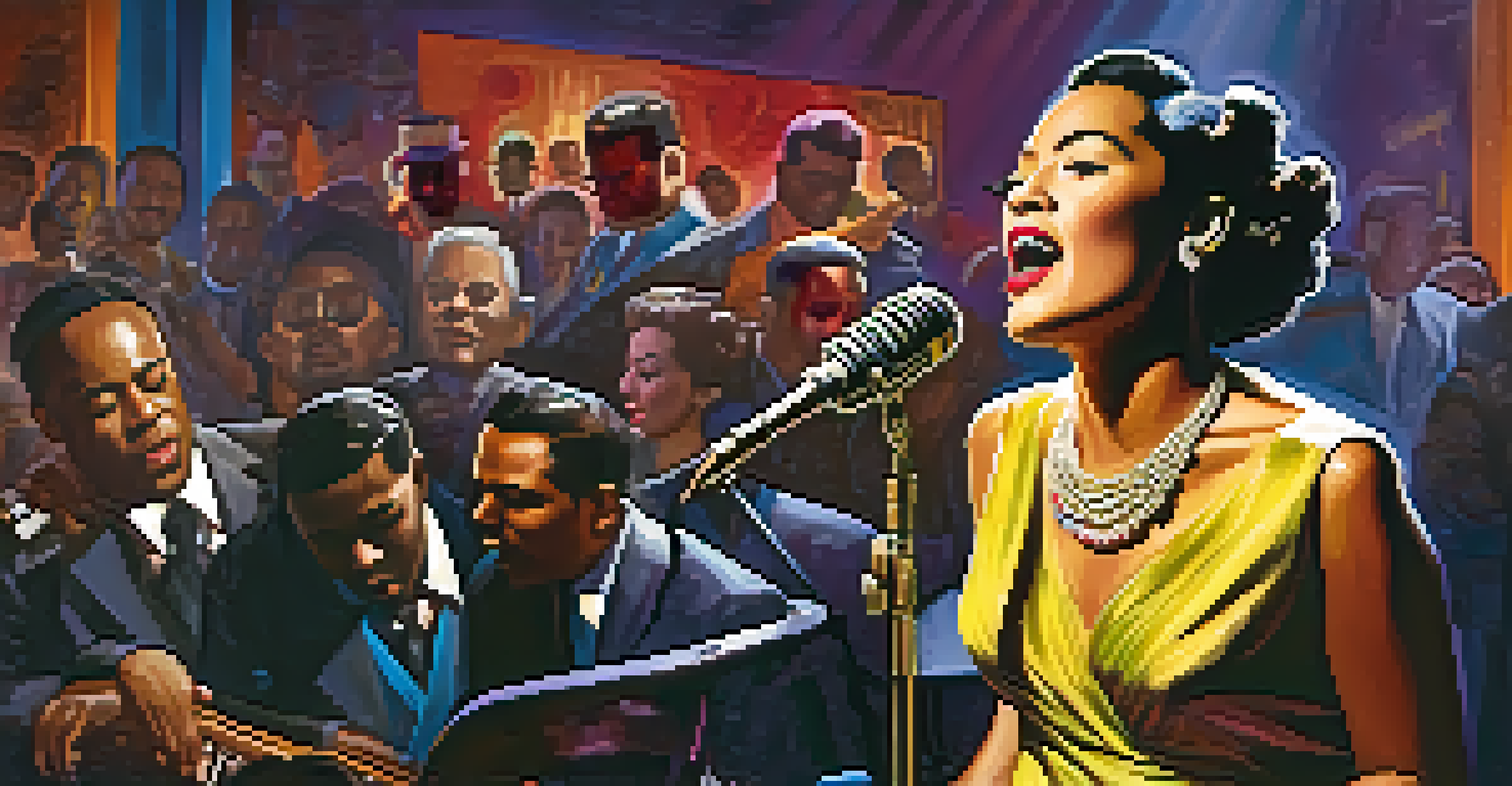The Role of Women in Shaping Music Genres Across History

Women in Early Music: Trailblazers of Sound
From the earliest days of music, women have been pivotal in shaping sounds and styles. In medieval Europe, women like Hildegard von Bingen composed sacred music that transcended time, showcasing the spiritual power of female creativity. Their contributions often went unrecognized, yet they laid the groundwork for future generations of female musicians.
The future belongs to those who believe in the beauty of their dreams.
During the Renaissance, women began to gain more visibility as composers and performers. Figures such as Francesca Caccini not only composed operas but also broke societal norms by performing publicly, paving the way for women in music. This shift marked the beginning of a long journey where women's voices started to resonate in an otherwise male-dominated space.
The influence of women in early music is a testament to their resilience and creativity, reminding us that history is often richer than it appears. Their stories are not just footnotes but essential chapters in the evolution of music. As we delve deeper, we see how these early contributions set the stage for future innovations.
The Rise of Female Voices in the 20th Century
The 20th century witnessed an explosion of female talent across various music genres, from jazz to rock and folk. Artists like Billie Holiday and Ella Fitzgerald not only captivated audiences with their powerful voices but also broke racial barriers in the music industry. Their artistry brought attention to social issues, reflecting the struggles and triumphs of their times.

As rock and roll emerged, women like Janis Joplin and Joan Jett challenged traditional gender roles and redefined what it meant to be a female artist. They infused their music with raw emotion and authenticity, inspiring countless others to follow suit. This era marked a significant shift, where women were not just performers but influential figures in shaping musical trends.
The 20th century was a period of liberation for many female artists, allowing them to express themselves freely and authentically. Their contributions have left an indelible mark on music history, inspiring future generations. The legacy of these trailblazers continues to resonate today, showcasing the enduring power of women's voices.
Women in Folk Music: Storytellers and Innovators
Folk music has long been a platform for storytelling, and women have played a crucial role in this narrative tradition. Artists like Joan Baez and Judy Collins not only brought folk music to the mainstream but also used their platforms to promote social justice causes. Their songs often reflected personal and political struggles, resonating deeply with audiences.
Music can change the world because it can change people.
The authenticity of female folk musicians has often stemmed from their lived experiences, adding depth to their music. By sharing their stories, they have created a space for dialogue around important issues such as civil rights and gender equality. Their ability to connect through storytelling has made folk music a powerful vehicle for change.
As we look at the evolution of folk music, it's clear that women have been instrumental in its growth and evolution. Their contributions remind us that music is more than entertainment; it's a powerful tool for social commentary. The legacy of female folk artists continues to inspire and uplift new generations of musicians.
Pop Music's Queens: Redefining the Genre
In the realm of pop music, women have consistently dominated the charts and shaped the genre's evolution. Icons like Madonna and Beyoncé have not only achieved commercial success but have also pushed cultural boundaries. Their music often addresses themes of empowerment, identity, and social issues, resonating with diverse audiences worldwide.
The rise of female pop stars in the late 20th and early 21st centuries has transformed the music industry. With their innovative styles, they have redefined what it means to be a pop artist. This shift has led to a more inclusive environment where diverse voices can thrive, showcasing the importance of representation in music.
Pop music continues to evolve, and women remain at the forefront of this change. As new artists emerge, they carry the torch lit by those who came before them, ensuring that the legacy of female empowerment in music endures. Their influence is a reminder that the pop genre is not just about catchy tunes; it's a platform for meaningful expression.
The Influence of Women in Hip-Hop Culture
Hip-hop, often viewed as a male-dominated genre, has seen remarkable contributions from women who have shaped its narrative. Pioneers like Queen Latifah and Missy Elliott broke barriers, using their platforms to address issues of race, gender, and empowerment. Their innovative styles and powerful lyrics have influenced countless artists and redefined the genre's boundaries.
As hip-hop evolved, female artists continued to emerge, each bringing their unique perspectives and experiences. Today, artists like Nicki Minaj and Cardi B not only dominate the charts but also challenge societal norms through their music. Their unapologetic attitudes and bold expressions have opened doors for new voices in the industry.
The evolution of women in hip-hop reflects a broader cultural shift towards inclusivity and representation. Their contributions have not only enriched the genre but have also sparked important conversations about identity and power. As hip-hop continues to grow, the influence of women remains a vital force in its narrative.
Women in Electronic Music: Pioneers of Sound
Electronic music has a rich history, and women have been at the forefront of innovation within this genre. Early pioneers like Wendy Carlos challenged expectations, creating groundbreaking works that combined classical music with electronic sounds. Their contributions laid the groundwork for future female producers and musicians in the electronic scene.
Today, artists such as Grimes and Nina Kraviz continue to push boundaries, blending genres and experimenting with sound. Their unique approaches have not only expanded the definition of electronic music but also inspired a new wave of female talent. This evolution highlights the importance of women's presence in a genre often dominated by male voices.
The impact of women in electronic music is a testament to creativity and innovation. As they continue to shape the genre, they remind us that music is a collaborative effort that thrives on diversity. The future of electronic music looks bright, thanks to the trailblazing women leading the way.
The Future: Women Shaping Music Today
As we look to the future, it’s clear that women are poised to continue shaping the landscape of music. Emerging artists across genres are breaking barriers, using platforms like social media to amplify their voices and reach wider audiences. This democratization of music allows for diverse perspectives and stories to be shared.
The rise of female-led collectives and collaborations further emphasizes the importance of community in music creation. By supporting one another, these artists are not only elevating their own careers but also creating a more inclusive industry. This spirit of collaboration fosters innovation and creativity, ensuring that women's contributions are celebrated.

The future of music is undoubtedly brighter with women at the helm. Their influence is pivotal in shaping not just the sounds we hear but also the narratives we engage with. As we celebrate their contributions, we look forward to a music industry that continues to evolve and thrive with diverse voices.